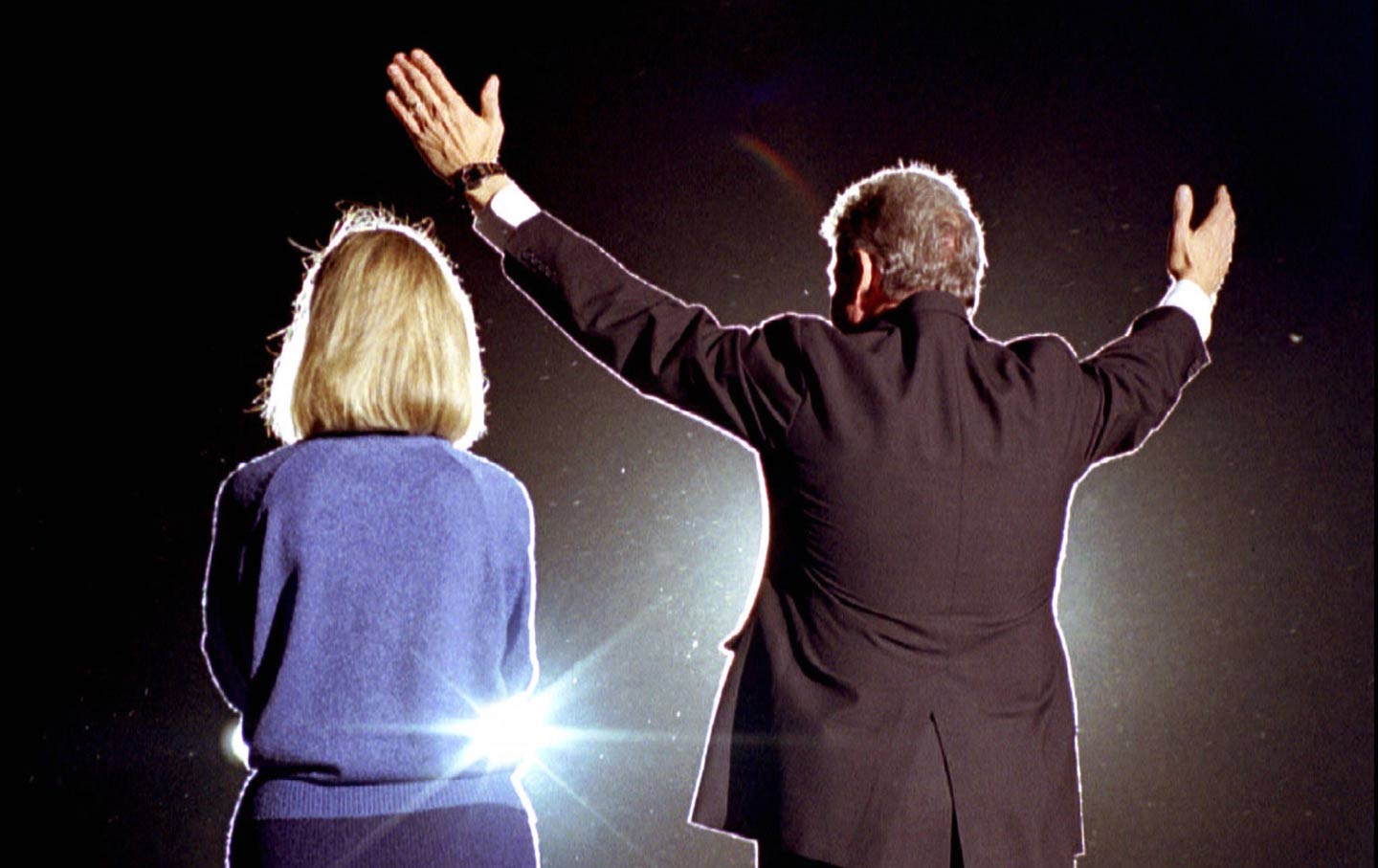Hillary and Bill Clinton in 1992. (Reuters Pictures)
Hillary Clinton loves black people. And black people love Hillary—or so it seems. Black politicians have lined up in droves to endorse her, eager to prove their loyalty to the Clintons in the hopes that their faithfulness will be remembered and rewarded. Black pastors are opening their church doors, and the Clintons are making themselves comfortably at home once again, engaging effortlessly in all the usual rituals associated with “courting the black vote,” a pursuit that typically begins and ends with Democratic politicians making black people feel liked and taken seriously. Doing something concrete to improve the conditions under which most black people live is generally not required.
Hillary is looking to gain momentum on the campaign trail as the primaries move out of Iowa and New Hampshire and into states like South Carolina, where large pockets of black voters can be found. According to some polls, she leads Bernie Sanders by as much as 60 percent among African Americans. It seems that we—black people—are her winning card, one that Hillary is eager to play.
And it seems we’re eager to get played. Again.
The love affair between black folks and the Clintons has been going on for a long time. It began back in 1992, when Bill Clinton was running for president. He threw on some shades and played the saxophone on The Arsenio Hall Show. It seems silly in retrospect, but many of us fell for that. At a time when a popular slogan was “It’s a black thing, you wouldn’t understand,” Bill Clinton seemed to get us. When Toni Morrison dubbed him our first black president, we nodded our heads. We had our boy in the White House. Or at least we thought we did.
Black voters have been remarkably loyal to the Clintons for more than 25 years. It’s true that we eventually lined up behind Barack Obama in 2008, but it’s a measure of the Clinton allure that Hillary led Obama among black voters until he started winning caucuses and primaries. Now Hillary is running again. This time she’s facing a democratic socialist who promises a political revolution that will bring universal healthcare, a living wage, an end to rampant Wall Street greed, and the dismantling of the vast prison state—many of the same goals that Martin Luther King Jr. championed at the end of his life. Even so, black folks are sticking with the Clinton brand.
What have the Clintons done to earn such devotion? Did they take extreme political risks to defend the rights of African Americans? Did they courageously stand up to right-wing demagoguery about black communities? Did they help usher in a new era of hope and prosperity for neighborhoods devastated by deindustrialization, globalization, and the disappearance of work?
No. Quite the opposite.
* * *
When Bill Clinton ran for president in 1992, urban black communities across America were suffering from economic collapse. Hundreds of thousands of manufacturing jobs had vanished as factories moved overseas in search of cheaper labor, a new plantation. Globalization and deindustrialization affected workers of all colors but hit African Americans particularly hard. Unemployment rates among young black men had quadrupled as the rate of industrial employment plummeted. Crime rates spiked in inner-city communities that had been dependent on factory jobs, while hopelessness, despair, and crack addiction swept neighborhoods that had once been solidly working-class. Millions of black folks—many of whom had fled Jim Crow segregation in the South with the hope of obtaining decent work in Northern factories—were suddenly trapped in racially segregated, jobless ghettos.
On the campaign trail, Bill Clinton made the economy his top priority and argued persuasively that conservatives were using race to divide the nation and divert attention from the failed economy. In practice, however, he capitulated entirely to the right-wing backlash against the civil-rights movement and embraced former president Ronald Reagan’s agenda on race, crime, welfare, and taxes—ultimately doing more harm to black communities than Reagan ever did.
We should have seen it coming. Back then, Clinton was the standard-bearer for the New Democrats, a group that firmly believed the only way to win back the millions of white voters in the South who had defected to the Republican Party was to adopt the right-wing narrative that black communities ought to be disciplined with harsh punishment rather than coddled with welfare. Reagan had won the presidency by dog-whistling to poor and working-class whites with coded racial appeals: railing against “welfare queens” and criminal “predators” and condemning “big government.” Clinton aimed to win them back, vowing that he would never permit any Republican to be perceived as tougher on crime than he.
Just weeks before the critical New Hampshire primary, Clinton proved his toughness by flying back to Arkansas to oversee the execution of Ricky Ray Rector, a mentally impaired black man who had so little conception of what was about to happen to him that he asked for the dessert from his last meal to be saved for him for later. After the execution, Clinton remarked, “I can be nicked a lot, but no one can say I’m soft on crime.”
Source: The Nation | Michelle Alexander

Comments